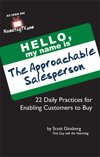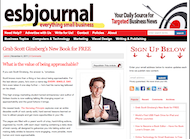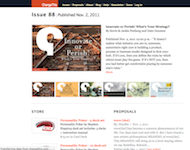 Small businesspeople are smart.
Small businesspeople are smart.
They’re masters of marketing, sales, leadership, operations and customer service.
But occasionally they forget basic elements that make them successful. And to ignore them is to ignore the potential of new business.
Straight from my monthly column at American Express Open Forum, make sure you don’t forget these four keys:
1. Simplicity is eloquence. It happens all the time. Nametag companies send me their fancy, cluttered badges to wear instead of my own. No thanks. Not that I don’t appreciate the gesture. In fact, I save all the nametags people send me. But my brand is a friend of simplicity. Is yours? Or, do you try to be too fancy, make things bigger than they need to be and create riddles that take too long for impatient customers to solve? Simple means instantly repeatable. Simple means easy enough for a kindergartner to understand. Simple means explainable in less than ten seconds with less than ten words. Simple means eliminating the extraneous, letting the necessary speak and disengaging the inessential.
Unfortunately, simple is hard. It requires more energy, more brainpower and more courage that complexity. But simplicity, pursued relentlessly, can change the world. Is your brand a friend of it?
2. Friendly costs nothing. My business card is a nametag. But it doesn’t say Scott – it says Scott’s Friend. I don’t give people a choice. Everybody my friend, whether they like it or not. Amigo del Mundo. That’s how I was raised. I want to be friends with everyone, all the time, everywhere. And I want to love everybody I meet forever and then some.
Over the years, these friend cards have created a lot of special moments. I’ll never forget the incident on the tarmac. I was waiting to board my plane when I felt someone’s eyes upon me. Glancing up at the door, I noticed the groundsman holding up his laminated security badge with one of my business cards facing outward. “Hey look everybody – I’m Scott’s Friend!” he laughed. “Wait a minute. Where did you get that? Have we met before?” “No, but you flew through here last week. And I think the zipper on your bag must have broke, because we found three hundred of your cards scattered across the runway!”
Great. Not only am I a litterbug, but now my contact information is all over the trash. “Oh, don’t worry about it Scott. Matter of fact, I made my entire staff on the runway wear your cards in their security badge holders.” “Really? Why?” “Well, our airport just got a new general manager. His name is Scott, and he doesn’t have any friends.” It’s not who you love – it’s whose life is better because you love them. How many friends did you make last week?
3. The problem with the Internet. When I went to my ten-year high school reunion, I had this romantic, cinematic vision that I’d walk in the door, tell everybody the story about how I made a career out of wearing nametag and watch as they listened in disbelief. One of those how-do-you-like-me-now moments. But it doesn’t work that way. Not anymore.
Instead of asking what I’ve been up to since graduation, former classmates I hadn’t seen in a decade came up to me – didn’t even say hello – poked my chest and asked to see my nametag tattoo. I’m fine, how are you? That’s the downside of the Internet: We never have to wonder about anything anymore. No finding things out on accident. No learning things through trial and error. No imagining things by sitting around and pondering. The Internet just gives you a blank box and puts the entire world behind it. And personally, I think that’s too easy.
The secret is, we can never bury our sense of wonder. It’s what makes us human, helps us feel alive and enables us to connect with each other. Einstein said imagination is more important than knowledge. I say imagination is more important than anything. What does your brand say?
4. Decide what your legend is. Whether I’m attending a conference with colleagues, practicing yoga with friends, interacting online with readers or having dinner with family, people constantly tell me stories about telling my story. A few years ago I was on the bike at the gym. The guy next to me noticed my nametag. And after a few moments of awkward silence, he launched right into the rumor:
“You know, I once heard a story about some guy who wore a nametag everyday in college. I think it was a sociological experiment or something. But they made a documentary about him. And think he set a world record. Pretty crazy, huh?”
I didn’t have the heart to tell him. The rumors were far too interesting to listen to. And I didn’t want to ruin the image he had about the story. So I just kept asking questions. “Did you ever meet him?” “What ever happened to that guy?” “Do you think he went crazy or something? I wonder if he knew I knew.
The point is, your brand tells a story whether you like it or not. And while facts are misleading, rumors are always revealing – even if they’re wrong. If you want to make your legend worth crossing the street for, if you want people to feel proud and eager to spread your myth, you have to manage your story like an asset. Because people don’t just buy what you sell – they buy what you tell. Are you spreading positive rumors about yourself?
REMEMBER: Never underestimate the power of continual application of the fundamentals.
Forget the rudiments and forego the revenue.
LET ME ASK YA THIS…
What are you overlooking?
LET ME SUGGEST THIS…
For the list called, “8 Ways to Out Give Your Competition,” send an email to me, and you win the list for free!
* * * *
Scott Ginsberg
That Guy with the Nametag
Author, Speaker, Publisher, Artist, Mentor
[email protected]
Now booking for 2012!
Watch The Nametag Guy in action here!


 Every culture responds to my nametag in its own unique way.
Every culture responds to my nametag in its own unique way. 
 Thanks to my friends at
Thanks to my friends at  After 4000+ days, I am convinced the societal implications of everybody wearing nametags could change our world forever.
After 4000+ days, I am convinced the societal implications of everybody wearing nametags could change our world forever.  Wearing a nametag every day isn’t much of an accomplishment.
Wearing a nametag every day isn’t much of an accomplishment. Wearing a nametag doesn’t just encourage people to be friendly.
Wearing a nametag doesn’t just encourage people to be friendly.